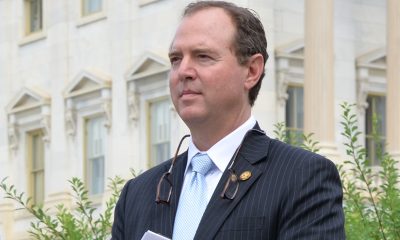Celebrity News
Harry Belafonte, ‘King of Calypso’ and LGBTQ ally, dies at 96
Civil rights icon was grand marshal of 2013 NYC Pride parade
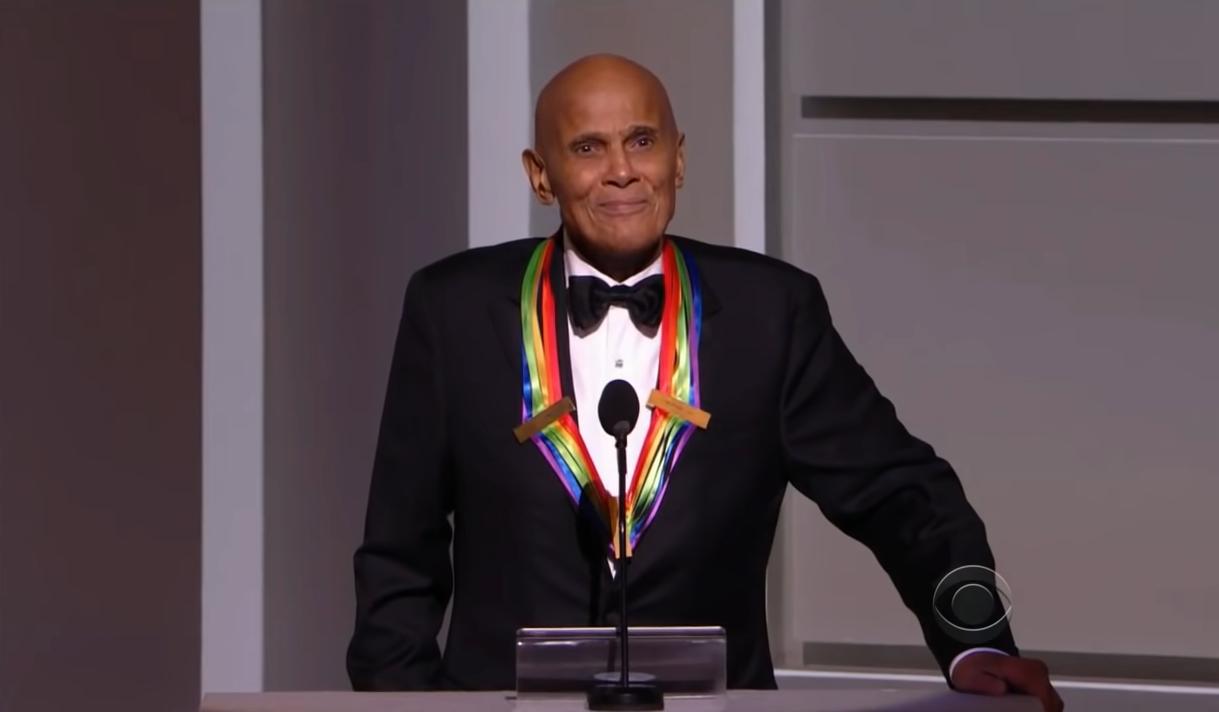
A rainbow banner slung over his right shoulder proudly proclaimed the spry octogenarian a “Grand Marshal 2013” of the New York City LGBT Pride March, joining another vibrant octogenarian, Edith “Edie” Windsor, who was also a “Grand Marshal 2013” that bright sunny June day.
Between the two of them, the honor was an acknowledgement of a long journey not only for LGBTQ rights, but for Harry Belafonte, the beloved African American actor, singer, humanitarian, and the acknowledged “King of Calypso” especially, an honored recognition of his decades of accomplishments and commitment to the civil rights movement and allyship to the LGBTQ community.
Thank you, Mr. B, for all of your years of mentorship, guidance, & lifetime of activism fighting for a better future for all of us. You will be missed by many, but your memory & impact live on. Rest in Power.
— Colin Kaepernick (@Kaepernick7) April 25, 2023
“Movements don’t die, because struggle doesn’t die.”
-Harry Belafonte pic.twitter.com/bCArTOtCC2
Born March 1, 1927, in New York, Belafonte was the son of Caribbean-born immigrants, and, growing up, he split his time between Harlem and Jamaica. Dropping out of high school in New York to enlist in the U.S. Navy, he went on to contribute to the war effort from 1944 to 1945.
At the time, the military services were segregated. Belafonte, a Jamaican American, was assigned to Port Chicago, Calif., 35 miles from San Francisco.
During World War II, Black service members were not normally assigned to frontline fighting units. Rather, they were assigned mostly to supporting specialties. His job was to load military ships bound for the Pacific theater.
Just before Belafonte arrived in Port Chicago, Calif., a massive explosion took place, involving military ships loaded with ammunition. About 320 people were killed — two-thirds of them Black sailors.
“It was the worst homefront disaster of World War II, but almost no one knows about it or what followed,” he said.
Discharged in 1945, Belafonte returned home to New York. He used his GI Bill benefits to pay for his acting classes at Erwin Piscator’s the New School Dramatic Workshop, alongside future actors Marlon Brando, Rod Steiger, Walter Matthau, and what was to develop into lifelong friendship, actor Sidney Poitier.
He performed with the American Negro Theater while studying at the Dramatic Workshop. It was a singing role that resulted in a series of cabaret engagements, and eventually, Belafonte even opened his own club. In 1949, he launched his recording career on the Jubilee label, and in 1953, he made his debut at the legendary jazz club, the Village Vanguard.
He also appeared on Broadway in the 1953 “John Murray Anderson’s Almanac,” a performance that won him a Tony Award.
Belafonte’s first widely released single, which became his signature audience participation song in virtually all of his live performances, was “Matilda,” recorded on April 27, 1953.
With a lead role in the film adaptation of Oscar Hammerstein’s Carmen Jones, Belafonte shot to stardom. After signing to the RCA label, he released Mark Twain and Other Folk Favorites, which reached the number three slot on the Billboard charts.
His breakthrough third studio album “Calypso” (RCA Victor-1956) became the first long-playing record in the world to sell over 1 million copies within a year. The album introduced American audiences to calypso music and Belafonte was dubbed the King of Calypso.
Besides calypso, he also recorded blues, folk, gospel, show tunes and American standards from “The Great American Songbook” as it is known that included works from George Gershwin, Irving Berlin and Cole Porter.
During the late 1950’s he performed during the so-called Rat Pack-era in Las Vegas. He and pianist Liberace, musician and singer Ray Vasquez, and singer Sammy Davis, Jr., were featured at the Sands Hotel and Casino and the Dunes Hotel.
Belafonte also became television’s first African-American producer, and his special “Tonight with Harry Belafonte” won an Emmy award in 1960. It was during this time period that he became proactively engaged in the civil rights movement in the 1950s and 1960s including the1963 Freedom March in D.C..
Belafonte befriended the leader of the movement, Dr. Martin Luther King, Jr., with whom he maintained close ties until King’s assassination in Memphis, Tenn., on April 4, 1968.
When I was a child, #HarryBelafonte showed up for my family in very compassionate ways.
— Be A King (@BerniceKing) April 25, 2023
In fact, he paid for the babysitter for me and my siblings.
Here he is mourning with my mother at the funeral service for my father at Morehouse College.
I won’t forget…Rest well, sir. pic.twitter.com/31OC1Ajc0V
He was also friends with New York Sen. Robert F. Kennedy, often spending time with Kennedy during the latter’s run for the U.S. Senate and also during the 1968 presidential campaign, which ended tragically after Kennedy was shot in the kitchen pantry area at the Los Angeles’ Ambassador Hotel on June 5, 1968. Kennedy died the next day on June 6, 1968, at Good Samaritan Hospital.
Prior to RFK’s assassination, on April 24, 1968, Belafonte interviewed Kennedy while guest hosting for Johnny Carson on the “Tonight Show.”
During the 1970s and 1980s, Belafonte refocused his efforts toward humanitarian causes, including joining with famed producer Quincy Jones and singer Michael Jackson on the USA for Africa’s “We Are the World,” project on March 7, 1985. Rolling Stone wryly noted in its article about the recording and humanitarian fundraiser, that the 46 star vocalists who showed up may have formed the ultimate musical supergroup of all time.
First lady Barbara Bush, standing in for her husband President George Herbert Walker Bush, presented the 12th Annual Kennedy Center Honors to Belafonte, along with his fellow honorees actress Mary Martin, dancer Alexandra Danilova, actress Claudette Colbert and composer William Schuman during a White House East Room ceremony on Dec. 3, 1989.
Two years previously, in 1987, he was appointed as a UNICEF Goodwill Ambassador, replacing Danny Kaye as UNICEF’s Goodwill Ambassador. His appointment as Goodwill Ambassador came 27 years after then President John F. Kennedy appointed Belafonte the first member of the entertainment industry to serve as cultural advisor to the Peace Corps.
In 1994, he received the National Medal of the Arts from President Bill Clinton. He has also been awarded the Ronald McDonald House Charities’ Award of Excellence in recognition of his humanitarian work and the Audrey Hepburn Humanitarian Award for 25 years of service to UNICEF.
In October 2017 he was awarded the Franklin D. Roosevelt Freedom Medal by the Roosevelt Institute in New York, the citation reading in part:
“In the decades since, you have been involved in campaigns to fight apartheid and bring relief to the world’s poorest. You founded We Are the World, which brought together some of the greatest talents in music to draw attention to and take on the scourge of famine in Africa. You have always used your platform to call out injustice and violence and make sure we never stopped believing that a more just, beautiful world was possible. Your voice — your life — has been a beacon of hope, comfort and inspiration to generations.”
Belafonte also served on the board of Americans for the Arts (formerly known as the American Council for the Arts) for many years. He has four children — Shari, Adrienne, Gina and David — and three grandchildren — Rachel, Brian and Maria. He lived with his wife photographer Pamela Frank who he had married in 2008.
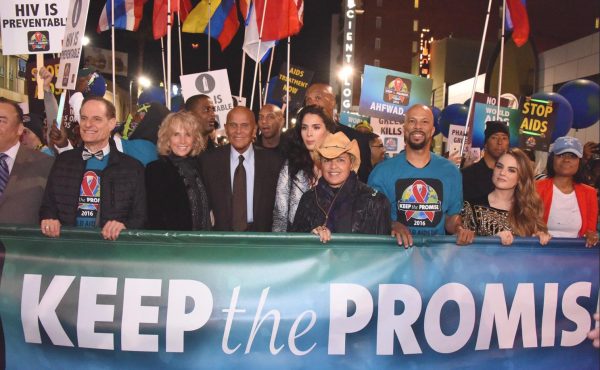
(Photo Courtesy of AHF)
“The world is a little dimmer today in losing such a legendary entertainer as Harry Belafonte but so much richer for having had such a tireless, lifelong humanitarian and activist for so many years. Rest easy, kind sir, after a job well done,” said Michael Weinstein, president of AIDS Healthcare Foundation.
“Belafonte leveraged his considerable and deserved celebrity for a myriad of causes over his lifetime, including the fight against HIV and AIDS. It was both humbling and a privilege for AHF to thank and honor him in person for his lifetime of activism and compassion.”
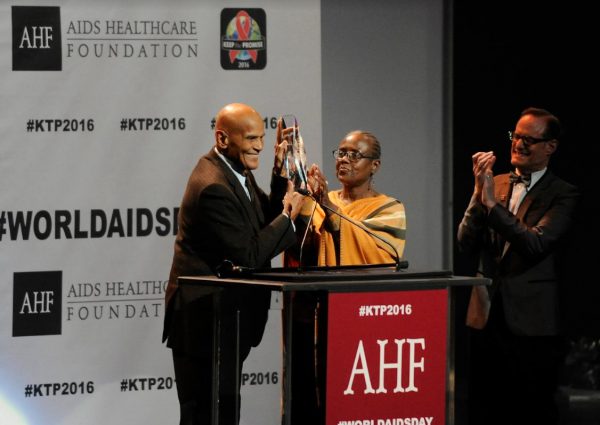
In 2016, AHF honored Belafonte with its Lifetime Achievement Award during its “Keep the Promise” World AIDS Day Concert and March in Hollywood, Calif.
Ever the activist, Belafonte, then 89, joined marchers for a brief but poignant portion of the march down Hollywood Boulevard.
The march commemorated the millions who have died of AIDS while also serving as a reminder to the world that of the then 36.7 million people living with AIDS worldwide, only 17 million had access to lifesaving antiretroviral treatment.
Belafonte received the AHF award during the concert that followed at the Dolby Theater featuring Patti LaBelle, Common and others who also paid tribute to the humanitarian icon.
Harry Belafonte was a barrier-breaking legend who used his platform to lift others up. He lived a good life – transforming the arts while also standing up for civil rights. And he did it all with his signature smile and style. Michelle and I send our love to his wife, kids, and… pic.twitter.com/g77XCr9U5b
— Barack Obama (@BarackObama) April 25, 2023
The White House issued a statement from President Joe Biden on Belafonte’s death:
“Jill and I are saddened by the passing of a groundbreaking American who used his talent, his fame, and his voice to help redeem the soul of our nation.
Harry Belafonte was born to Caribbean parents in Harlem, New York on March 1, 1927, when segregation was the order of American society. To our Nation’s benefit, Harry never accepted those false narratives and unjust boundaries. He dedicated his entire life to breaking barriers and bridging divides.
As a young man motivated to find his purpose, he became mesmerized by theater when he saw a performance of the American Negro Theater in Manhattan. As one of America’s original breakthrough singers and performers, he would go on to garner a storehouse of firsts — the first Black matinee idol, the first recording artist to sell over a million records, the first Black male Broadway actor to win a Tony award, the first Black producer to win an Emmy award, and one of the highest paid entertainers of his time, among other accolades.
But he used his fame and fortune for the public good throughout his extraordinary career. He became a powerful ally of Dr. Martin Luther King, Jr., and other giants of the Civil Rights Movement. He raised money and donated resources to post bail for activists jailed for acts of civil disobedience. He provided the critical funds to launch the Freedom Rides.
He lobbied against apartheid in South Africa, for the release of Nelson Mandela, and was one of the visionaries behind ‘We Are the World,’ an innovative record released to raise millions of dollars to support humanitarian aid in Sudan and Ethiopia. For these and other humanitarian and artistic efforts he was conferred with a Kennedy Center Honor, the National Medal of the Arts, and a Grammy lifetime achievement award.
Harry Belafonte’s accomplishments are legendary and his legacy of outspoken advocacy, compassion, and respect for human dignity will endure. He will be remembered as a great American.
We send our deepest condolences to his family and legions of admirers across the country and the world.”
Harry Belafonte was one of our favorite guest stars on The Muppet Show and a great friend to The Muppets. In his work on and off the stage, he helped us all to see one another clearly and truly turned the world around. We will never forget you, Harry! pic.twitter.com/euMQFDpvJj
— The Muppets (@TheMuppets) April 25, 2023
****************************************************************************************
Additional research and materials from the Defense Department, the Kennedy Center Honors, UNICEF, the John F. Kennedy Library, the George Bush Library, the William J. Clinton Library, the George W. Bush Library, the Barack Obama Library, RCA Records, AFI and the Recording Academy.
Celebrity News
Nina West’s ‘Sugar in the Tank’ tour comes to Rehoboth Beach
Drag Race’ contestant will be at Clear Space Theater Company on July 6
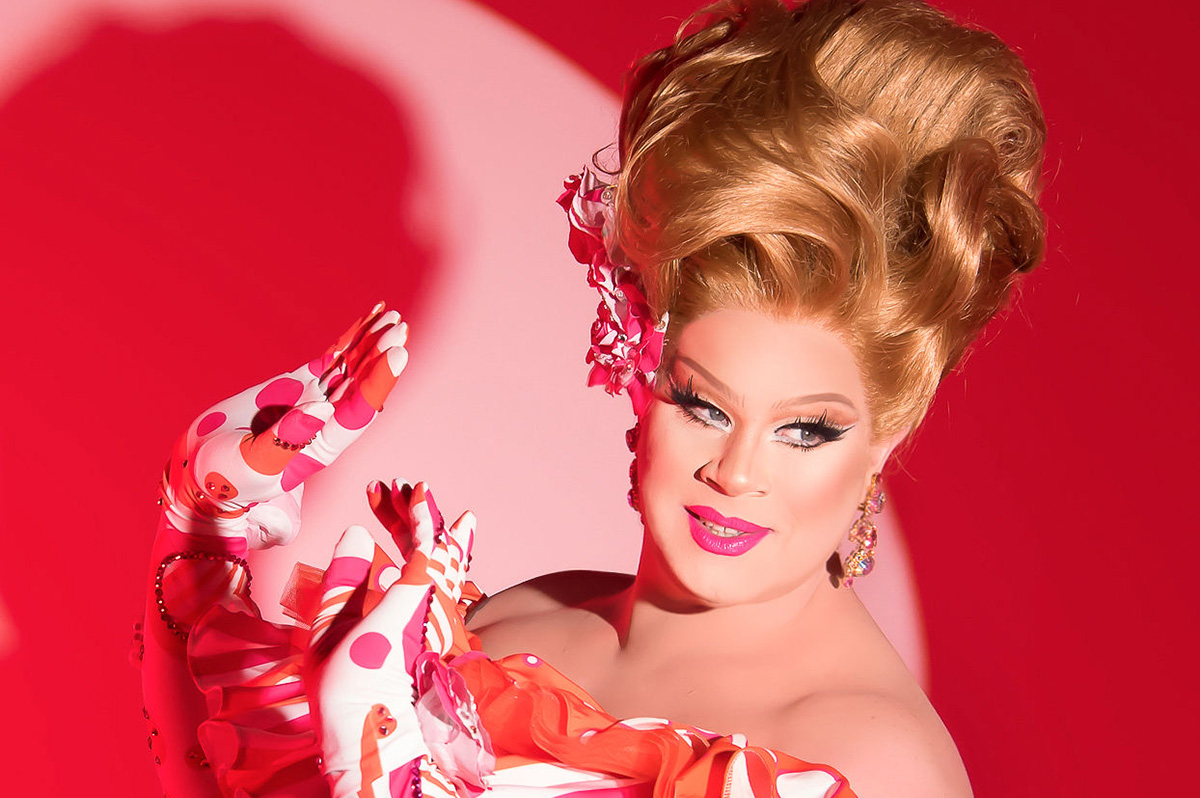
Nina West, a drag queen known for competing on “RuPaul’s Drag Race,” is currently on her ‘Sugar in the Tank’ tour around U.S. cities.
With previous shows in Key West, Fla., New York, and hometown of Columbus, Ohio, the tour is staying put in Provincetown, Mass., from late July to early September. It will make a stop at Clear Space Theater Company in Rehoboth Beach, Del., as part of a summer cabaret series on July 6.
Andrew Levitt has been performing as Nina West for 25 years, who got her rise from starring in “Drag Race” Season 11, where she placed sixth and won Miss Congeniality, a title awarded to the contestant who is regarded as the kindest and most helpful one of that season.
West has toured “Hairspray” on Broadway as Edna Turnblad, starred in a couple of feature films and published a children’s book titled ‘The You Kind of Kind.’
Levitt said he wrote this show in response to attacks from the government towards the LGBTQ community.
“‘Sugar in the Tank’ is a big old gay fabulous summer musical,” Levitt told the Washington Blade. “The show is a response to the darkness that I think has fallen over a lot of people in the country and it’s hopefully trying to bring a little bit of light and a little bit of joy.”
“Sugar in the Tank” is a Southern euphemism for gay, often holding a negative connotation. Levitt said he wanted to “reclaim and embrace” queerness in times when some people want to take that away.
Levitt said he knew he would be traveling to predominantly queer destinations like Key West and Provincetown for these shows and that was always at the forefront of his mind when writing “Sugar in the Tank.”
This will be Levitt’s first time in Rehoboth Beach. Clear Space Theater is considered Delaware’s second-largest professional non-profit theater and the state’s most prolific producer of professional theater. The space seats just 170 patrons and Levitt said he loves the intimacy of a small venue and that it’s his favorite way to do a show.
“Stages like this size are the perfect size for me because it allows for me to really showcase my talents,” Levitt said.
Levitt founded the Nina West Foundation in 2015 to uplift and sustain the central Ohio LGBTQ community, which has raised more than $3 million for various organizations. He said he makes activism part of the entertainment in his career.
“That’s the nuance of what drag is. We can be ridiculous for fun and we can be serious but it’s all wrapped up into one thing,” Levitt said. “I think that can be the power of it.”
Levitt said West is so much more confident now than when he first started performing as her. He didn’t know where his voice belonged in the community in the past, but because of those who came before him in this art form, he has learned to harness the power of the stage and the power of the wig to be able to tell stories.
“I really love my community. I love queer people. I love who we are and what we represent,” Levitt said. “Knowing our history and knowing that we’ve been through a lot, I’m really thrilled that as a queen, I can use my voice and my platform to help try to better our community, not try to speak for everyone but try to lend voice to people who desperately need it.”
Levitt’s advice to young queer artists is to not give up on yourself, surround yourself with supportive people and allow yourself the opportunity and space to fail, to ask questions, and to not give up.
“Our young people have got to be told they matter,” Levitt said. “Oftentimes, people are told that they don’t matter, that their voice doesn’t matter, that they cannot make a difference and I want to remind every single person who’s doing this that they do matter, they can make a difference, their voice is intrinsic to who we are as a community.”
If Sugar in the Tank was a drink, it would be a Bahama Mama or Sex on the Beach, said Levitt, because they are delicious, juicy, and sugary, just like the show.
“I just want everyone to know that they should come to ‘Sugar in the Tank’ and experience a show that’s built on joy and levity and silliness and fun and come have some fun with me and show me the fabulous love of Rehoboth Beach,” Levitt said. “I can’t wait.”
Celebrity News
Brazilian police arrest two men who allegedly targeted Lady Gaga concert
Authorities say suspects wanted to target LGBTQ Brazilians

Brazilian police have arrested two people who allegedly sought to detonate explosives at a free Lady Gaga concert that took place on Rio de Janeiro’s Copacabana Beach on Saturday.
The Associated Press reported Felipe Curi, a spokesperson for the city’s Civil Police, told reporters the men who authorities arrested hours before the concert took place wanted to target LGBTQ Brazilians. Civil Police Chief Luiz Lima said the men posted hate speech and violent content online “aimed at gaining notoriety in order to attract more viewers, more participants — most of them teenagers, many of them children.”
“They were clearly saying that they were planning an attack at Lady Gaga’s concert motivated by sexual orientation,” said Cury, according to the AP.
An estimated 2.5 million people attended the concert.
A Lady Gaga spokesperson told the AP the singer learned about the threats on Sunday from media reports.
“Prior to and during the show, there were no known safety concerns, nor any communication from the police or authorities to Lady Gaga regarding any potential risks,” said the spokesperson. “Her team worked closely with law enforcement throughout the planning and execution of the concert and all parties were confident in the safety measures in place.”
Lady Gaga in an Instagram post thanked her Brazilian fans.
“Nothing could prepare me for the feeling I had during last night’s show — the absolute pride and joy I felt singing for the people of Brazil,” she wrote. “The sight of the crowd during my opening songs took my breath away. Your heart shines so bright, your culture is so vibrant and special, I hope you know how grateful I am to have shared this historical moment with you.”
“An estimated 2.5 million people came to see me sing, the biggest crowd for any woman in history. I wish I could share this feeling with the whole world — I know I can’t, but I can say this — if you lose your way, you can find your way back if you believe in yourself and work hard,” added Lady Gaga. “You can give yourself dignity by rehearsing your passion and your craft, pushing yourself to new heights — you can lift yourself up even if it takes some time. Thank you Rio for waiting for me to come back. Thank you little monsters all over the world. I love you. I will never forget this moment. Paws up little monsters. Obrigada. Love, Mother Monster.”
An estimated 1.6 million people attended Madonna’s free concert on Copacabana Beach last May.
Celebrity News
Cynthia Erivo to headline WorldPride Saturday concert
‘An extraordinary moment of unity, celebration, and visibility’
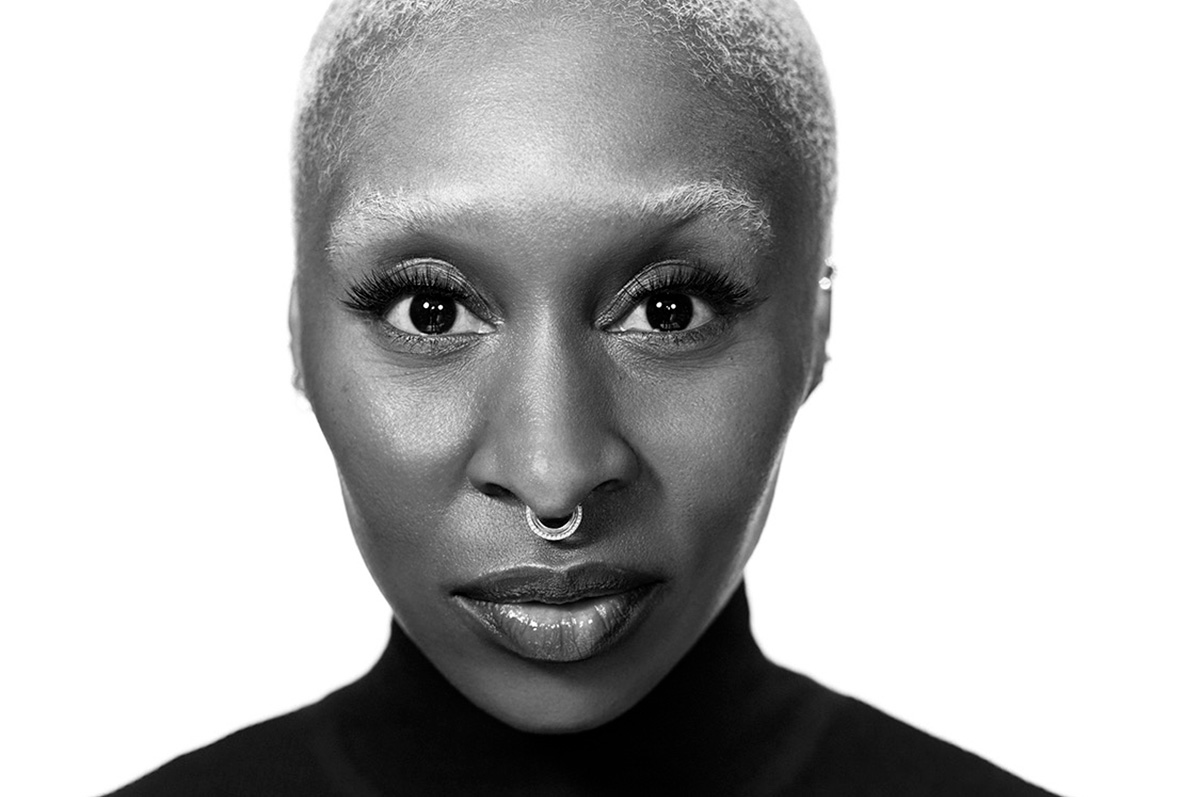
WorldPride DC 2025 announced today that “Wicked” star, LGBTQ icon, and award-winning performer Cynthia Erivo will headline the WorldPride 2025 Saturday night Street Festival and Concert on the Capitol Stage following the parade.
A multi-week long series of events, WorldPride DC 2025 culminates in a free, inclusive, two-day event June 7-8, 2025. The event features a mix of local artists, DJs, and performers alongside big names in entertainment like Erivo. Taking place June 7-8 along Pennsylvania Avenue, the weekend WorldPride spectacular is to be a display of “pride, music, and unity.”
Erivo delivers “a powerhouse headlining performance against the iconic backdrop of the U.S. Capitol Building,” according to organizers.
“As the culminating event for the parade, the Saturday night concert will be an extraordinary moment of unity, celebration, and visibility for our global LGBTQ+ community,” said Ryan Bos, executive director of the Capital Pride Alliance, host of WorldPride 2025. “Cynthia Erivo’s powerful artistry and unwavering advocacy make her the perfect artist to headline this momentous event.”
An actress, producer, singer, songwriter, and advocate for the LGBTQ and Black communities, Erivo has been making even larger headlines after starring in the award-winning “Wicked” movie alongside Ariana Grande. Having recently embraced her LGBTQ identity, Erivo has been using this platform to promote representation.
The free WorldPride 2025 Street Festival and Concert takes place in front of the U.S. Capitol building. The event is set to bring together visitors from across the U.S. and the world, featuring exhibitors, artisans, food and beverage gardens, and a diverse range of local, national, and big-named artists.
WorldPride plans to announce the names of additional artists and performers in the coming days.
According to WorldPride organizers, the theme The Fabric of Freedom “symbolizes the unity and resilience of the LGBTQ+ community. Following the 2024 presidential inauguration, it serves as a reminder of the ongoing fight for equality and the strength found in diversity.”
Outside of the official WorldPride events, other associated concerts will be taking place that weekend, including the recently announced Project Glow-organized World Pride Music Festival featuring Jennifer Lopez and Troye Sivan, which garnered some controversy by including the artist Grimes, a former partner of Elon Musk.
-

 U.S. Supreme Court3 days ago
U.S. Supreme Court3 days agoSupreme Court to consider bans on trans athletes in school sports
-

 Out & About3 days ago
Out & About3 days agoCelebrate the Fourth of July the gay way!
-

 Virginia3 days ago
Virginia3 days agoVa. court allows conversion therapy despite law banning it
-

 Federal Government5 days ago
Federal Government5 days agoUPenn erases Lia Thomas’s records as part of settlement with White House





